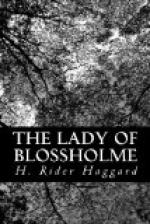“Emlyn, I want what I always wanted and you always refused—your help, your partnership. I mean the partnership of that brain of yours—the help of the knowledge that you have—no more. At Cranwell Towers you called down evil on me. Take off that ban, for I’ll speak truth, it weighs heavy on my mind. Let us bury the past; let us clasp hands and be friends. You have the true vision. Do you remember that when you thought Cicely dead, you said that her seed should rise up against me, and now it seems that it will be so.”
“What would you give me?” asked Emlyn curiously.
“I will give you wealth; I will give you what you love more—power, and rank too, if you wish it. The whole Church shall listen to you. What you desire shall be done in this realm—yes, and across the world. I speak no lie; I pledge my soul on it, and the honour of those I serve, which I have authority to do. In return all I ask of you is your wisdom—that you should read the future for me, that you should show me which way to walk.”
“Nothing more?”
“Yes, two things—that you should find me those burned jewels and with them the old letters that were not burned, and that this child of the Lady Cicely shall not chance to live to take what you promised to it. Her life I give you, for a nun more or less can matter little.”
“A noble offer, and in this case I am sure you will pay what you promise—should you live. But what if I refuse?”
“Then,” answered the Abbot, dropping his fist upon the table, “then death for both of you—the witch’s death, for I dare not let you go to work my ruin. Remember, I am master here, you are my prisoners. Few know that you live in this place, except a handful of weak-brained women who will fear to speak—puppets that must dance when I pull the string—and I’ll see that no soul shall come near these walls. Choose, then, between death and all its terrors or life and all its hopes.”
On the table there stood a wooden bowl filled with roses. Emlyn drew it to her, and taking the roses into her hands, threw them to the floor. Then she waited for the water to steady, saying—
“The riddle is hard; perhaps, if in truth I have such power, I shall find its answer here.” Presently, as he gazed at her, fascinated, she breathed upon the water and stared into it for a long while. At length she looked up, and said—
“Death or Life; that was the choice you gave me. Well, Clement Maldonado, on behalf of myself and the Lady Cicely, and her husband Sir Christopher, and the child that shall be born, and of God who directs all these things, I choose—death.”
There was a solemn silence. Then the Abbot rose, and said—
“Good! On your own head be it.”
Again there was a silence, and, as she made no answer, he turned and walked towards the door, leaving her still staring into the bowl.
“Good!” she repeated, as he laid his hand upon the latch. “I have told you that I choose death, but I have not told you whose death it is I choose. Play your game, my Lord Abbot, and I’ll play mine, remembering that God holds the stakes. Meanwhile I confirm the words I spoke in my rage at Cranwell. Expect evil, for I see now that it shall fall on you and all with which you have to do.”




